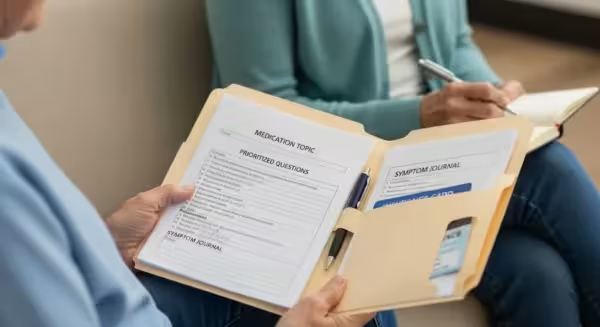
Frequently Asked Questions
Q: My doctor just prescribed a new medication, but my Part D plan says it isn’t on its formulary. What can I do?
A: Don’t panic. Your first step is to talk to your doctor. They can help you request a “formulary exception” from your insurance plan. This is a formal process where your doctor explains to the plan why that specific drug is medically necessary for you and why the covered alternatives are not appropriate. If the exception is approved, the plan will cover the drug. If it’s denied, you have the right to appeal the decision.
Q: Can I use a discount card like GoodRx at the same time as my Medicare Part D plan to lower my copay?
A: No, you cannot combine them for a single transaction. You must choose one or the other at the pharmacy counter. The best practice is to ask the pharmacist to tell you two prices: the price using your insurance and the price using the discount card. You can then choose to pay whichever one is lower. Remember, if you use the discount card, the money you spend will not count toward your plan’s annual deductible or out-of-pocket maximum.
Q: I think I’m in the Medicare donut hole. What is the smartest way to save money until I get out?
A: The donut hole is precisely the time when strategies beyond your insurance become most valuable. Since your out-of-pocket costs are higher (25% of the drug’s price), the savings from a prescription discount card can be substantial. This is also an excellent time to apply for a Pharmaceutical Assistance Program (PAP) from the drug’s manufacturer, as you may now meet their income and coverage-gap criteria. Continuing to use generics whenever possible will also help you move through this phase more affordably.
Q: I heard on the news that Medicare can negotiate drug prices now. How will this help me?
A: You are correct. The Inflation Reduction Act gave Medicare the power to negotiate prices directly with manufacturers for certain high-cost drugs. The first group of 10 drugs was announced in 2023, and their negotiated prices will take effect in 2026. More drugs will be added in subsequent years. While this won’t lower your costs on those specific drugs tomorrow, it is a landmark change that will help control prices and lower costs for seniors over the long term. The more immediate benefit of that law is the $35 monthly cap on insulin and the upcoming $2,000 annual cap on out-of-pocket costs in 2025.
Q: Is it safe and legal to order my prescriptions from an online Canadian pharmacy to save money?
A: While many Americans do this, it’s important to know the risks. Technically, it is illegal for individuals to import prescription drugs into the United States for personal use. The FDA cannot guarantee the safety, effectiveness, or quality of drugs purchased from foreign sources, as they are not subject to U.S. regulatory oversight. While the risk of legal action against an individual is low, the health risk from a potentially counterfeit or substandard product is real. It is generally safer to pursue the many legal cost-saving strategies available within the U.S.
Disclaimer: This article is for informational purposes and is not a substitute for professional financial or tax advice. Consult with a certified financial planner or tax professional for guidance on your specific situation.















